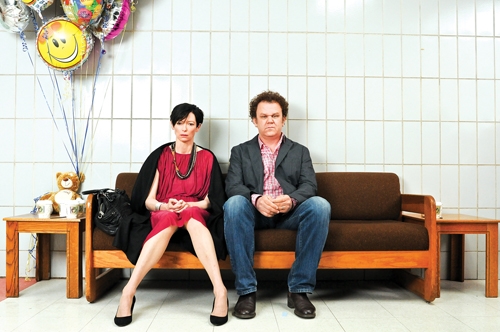Director Lynne Ramsay owes nothing to tabula rasa with her 2011 film starring Tilda Swinton and John C. Reilly
Justin Li
Contributor

A mother stares at her son. With a look of exasperation and discontent, she says to him, “Mommy wakes up every morning, and wishes she was in France.” Is the mother a bad parent? Is the child an unbearable source of burden? Are children culpable for their own misdeeds and bad behavior, or are the parents solely to blame?
These are just some of the questions that are raised in Lynne Ramsay’s poignant and melancholic We Need to Talk About Kevin, based on Lionel Shriver’s 2003 novel. In the perpetual debate between Nature versus Nurture, this film firmly plants itself on the side of the former.
Tilda Swinton plays Eva, a once successful travel writer who sacrifices her career to marry her beau (John C. Reilly) and raise their son, Kevin. When she wakes up one day to find the exterior of her dull white house defaced with bright red paint—the red symbolism permeates this film—we find out that this is in retaliation for something terrible that Kevin had done, for which he is imprisoned.
The entire town, it seems, blames Eva. The film then cuts back and forth between past and present, and by observing Kevin’s childhood and Eva’s struggle to raise him, Ramsay lets the audience act as a jury in deciding who is ultimately responsible for Kevin’s actions: Kevin or Eva, Nature or Nurture.
Through Eva’s flashbacks and daydreams, Kevin is slowly revealed to be a defiant, callous, Machiavellian child. Since birth, Kevin shows an inexplicable disdain for his mother, finding every opportunity to cause her emotional and psychological pain.
Although young, it seems that Kevin is masterfully manipulative. In one particular instance, when Eva is tutoring Kevin in math, she asks him, “What number comes after seven?” to which he replies, “71.” After reading the frustration on her face, he proceeds to flawlessly count from one to fifty and crumple up the worksheet. To compound his mother’s misery, Kevin is openly co-operative and loving towards his father, causing her to doubt her ability as a mother.
Eva is not a natural nurturer. As a former travel writer, she has been to some of the most exotic places on earth, and feels confined and trapped at home. She regrets ever having the child, and rues the day she gave birth to him. With every misstep and altercation, Kevin becomes more disillusioned with parenthood, and it’s surprising that Eva even tries.
But that is the key discrepancy—she does try. She understands her duties as a mother, but no matter how hard she tries, her inherent inability, coupled with Kevin’s inherent inflexibility, causes her to fail. Her second child, Celia, proves to be a sharp contrast to her first. Celia’s docile and acquiescent demeanor serves as juxtaposition to Kevin’s, supporting Ramsay’s contention that a person’s behavior, whether good or bad, is ingrained in that individual from birth.
Tilda Swinton’s performance is nothing short of immaculate. As Eva, Swinton is fragile, vulnerable, and fascinatingly flawed. She is able to evoke a cascade of emotions. From despair to relief, and from happiness to grief, Swinton demonstrates her unlimited range, proving herself to be one of the great actresses of our generation. Her performance will be one of the most talked about for the rest of the year.


